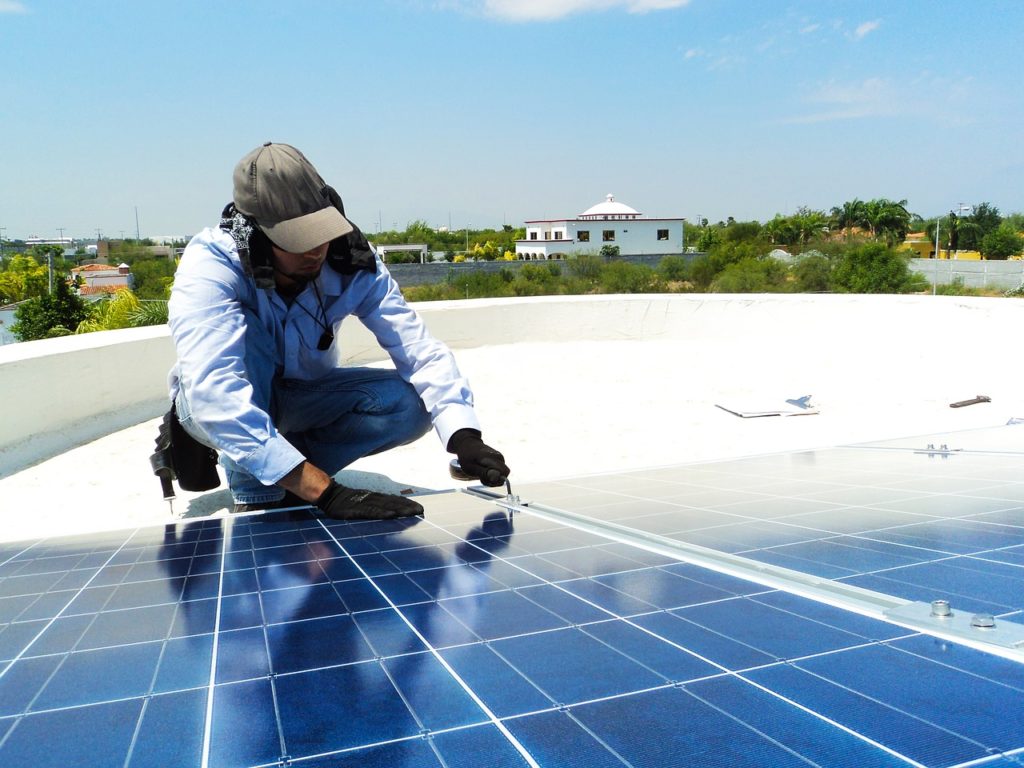 Installing solar panels on a home’s rooftop is a great way to go green and save money on your electricity bill, but how do you pay for the solar power system?
Installing solar panels on a home’s rooftop is a great way to go green and save money on your electricity bill, but how do you pay for the solar power system?
Here’s a comparison of seven different financing options and the pros and cons of each, so you can make an educated decision on which purchase method is right for you and your home.
Pay cash
By purchasing your solar power system outright with cash, you will be making a great investment in solar energy.
- Pros: You’ll be entitled to a variety of rebates, incentives, and tax credits which will reimburse a large portion of your initial purchase costs. You will save significantly on your electricity bill and you’ll also be making money when you sell your power back to utility companies. Plus, the system will increase the resale value of your home.
- Cons: You’ll be paying $10,000-$20,000 upfront. Warranties last 25-30 years but you will be the one responsible for the maintenance of your system.
Solar lease
With a solar lease, the solar provider owns your solar power system and you lease its use by paying a predetermined monthly amount regardless of how much electricity the solar panels produce.
- Pros: Upfront costs are low and getting started is easy since you don’t have to deal with inspections, permits, or excessive paperwork. You are not responsible for the monitoring and maintenance of your solar system, but you may have the ability to track the performance of your system on a mobile device. Many leases come with the option to buy the solar panels after the terms of the contract are up.
- Cons: Since you don’t own the solar power system, you are not eligible for incentives and tax credits.
Power-purchase agreement
A power-purchase agreement (PPA) is similar to a solar lease except you pay per kWh generated. As a solar PPA customer, you only pay for solar power, not the equipment or installation.
- Pros: The pricing is predictable for 15-20 years and upfront capital isn’t needed. You are not responsible for maintaining, servicing, and insuring your solar power system. You may have the option to purchase your system after the contract term is over.
- Cons: Transaction costs and complex negotiations may take place. You are not eligible for incentives and tax credits.
PACE loan program
Through a PACE (Property Assessed Clean Energy) Program, a homeowner borrows money from the city, town, county, or state in which they reside. These programs are available in 27 states. If you sell your home, the tax liability is transferred to the new owner.
- Pros: No credit check is required, electricity savings usually exceed the loan payments, and the equity in your home is not reduced.
- Cons: The loan is paid back through higher property taxes over 15-20 years.
Home equity line of credit or home equity loan
Borrowers can take out a home equity line of credit or home equity loan where your house is used as collateral.
- Pros: Homeowners usually save more in electricity bills compared to their loan payments. Interest rates are generally low.
- Cons: You’ll need a good credit rating to be approved for your loan. Your home will have a lien against it so you are at risk of losing it if you are unable to make required loan payments. Also, the equity in your home will be reduced.
Energy efficient mortgage
An EEM (Energy Efficient Mortgage) is offered by the federal government and is credited into the mortgage itself.
- Pros: Energy-efficient homes cost less to operate and saving on utilities frees up money for a higher mortgage. Also, borrowers may get a larger tax deduction from the interest on their mortgage payment.
- Cons: Your home will need to be rated by a professional energy audit (costing between $100-$300) before financing is approved. In new construction, the addition of energy improvements may not be valued or appraised fairly.
Community or shared solar
Even if your home isn’t well-suited for solar due to shading, structure, or ownership issues, it still may be possible for you to subscribe to shared solar within your community.
- Pros: Any energy bill savings earned by households through community solar are not considered income. Therefore, the possibility of associated taxation is avoided.
- Cons: Each household can only source enough power to meet their own annual needs.
There are many financing options available for all kinds of situations. Every year, solar power becomes more viable for families across the country.
Image from Pixabay
Rachelle Wilber
Latest posts by Rachelle Wilber (see all)
- 7 Solar Panel Financing Options - October 10, 2016
- Revamp, Recharge, and Remake Your Home Into a Paradise - September 5, 2016
- 4 Career Ideas for Adventurous Individuals - July 13, 2016




Great and very informative blog , It will really very helpful for me to pay for solar panels. I think the best option is Power Purchase Agreement But I have a question after its 15-20 years can we purchase its equipment without installation and equipment bill?
If yes then is there any warranty of equipment? Please give answer.